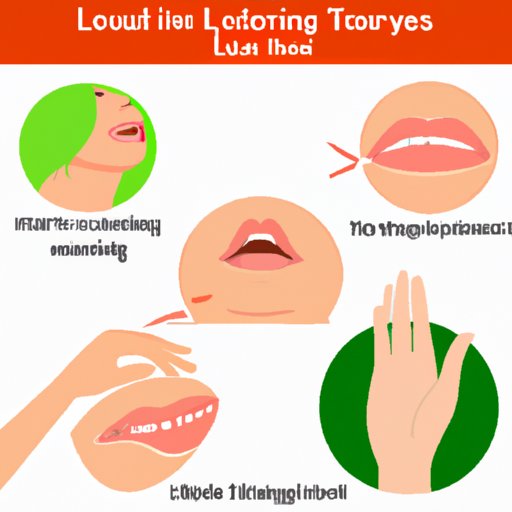
Introduction
Laryngitis is a common condition that can cause discomfort or pain, and can even make it difficult to speak. Whether it’s caused by overusing the voice, an infection, or other triggers, laryngitis can be a frustrating condition to deal with. But the good news is that there are many treatments available to help soothe symptoms and speed up recovery. In this article, we will explore how to treat laryngitis using a variety of natural remedies, medical treatments, and coping strategies.
Understanding the causes of laryngitis
Laryngitis can be caused by a variety of triggers. Acute laryngitis is usually caused by a viral or bacterial infection, while chronic laryngitis is often the result of repeated overuse of the voice. Other factors that can cause laryngitis include exposure to environmental irritants like dust or smoke, allergies, acid reflux, and even certain medications.
To prevent laryngitis from occurring, it can be helpful to avoid smoking and exposure to secondhand smoke. It’s also important to speak loudly only when necessary, and to use good vocal techniques when singing or speaking for extended periods of time.
Natural remedies for treating laryngitis
There are many natural remedies that can help soothe the inflammation and pain associated with laryngitis. One of the most well-known natural remedies for laryngitis is a concoction of honey and lemon. This mixture works by coating the vocal cords and providing relief from irritation. Steam inhalation can also be helpful for soothing the throat. Simply boiling water and breathing in the steam can help to alleviate symptoms.
Herbal teas are another popular natural remedy for laryngitis. Teas made from chamomile, ginger or licorice root can be particularly helpful in reducing inflammation and soothing sore throat. These remedies can easily be incorporated into your daily routine, either by sipping on tea or incorporating honey and lemon into hot water.
Home remedies for soothing a sore throat
In addition to natural remedies, there are several home remedies that can help relieve throat pain. Saltwater gargles can be effective at reducing inflammation and providing relief from soreness and swelling. Throat lozenges can also be helpful for numbing the throat and making it easier to speak or swallow.
Using a humidifier can also be helpful, especially if the air is dry and irritating the throat. Humidifiers add moisture to the air and can help ease laryngitis symptoms like dry cough and throat pain.
Voice and speech exercises
Voice and speech exercises can be helpful in reducing strain on the voice, improving clarity and promoting healing. Breathing and relaxation exercises can help to promote relaxation and flexibility in the vocal cords. Other exercises include massaging the neck and throat, practicing controlled breathing exercises and speaking in a soft, gentle voice.
Medical treatments for laryngitis
If natural remedies and home remedies aren’t enough to alleviate your laryngitis symptoms, there are several medical treatments available. If laryngitis is caused by a bacterial infection, your doctor may prescribe antibiotics to treat the underlying infection. Inflammation can also be managed through anti-inflammatory medication, or steroid treatment.
It’s important to consult with your doctor before seeking treatment, as the cause of laryngitis can vary and require different approaches. Your doctor may also recommend a visit with a speech-language pathologist for further management and improvement of symptoms.
Coping with laryngitis
If you are experiencing laryngitis, there are several coping strategies you can use to manage your symptoms. One of the most important strategies is to conserve your voice by resting the vocal cords as much as possible. This means avoiding shouting, whispering or talking for extended periods of time. Adjusting your diet can be helpful, as acidic foods and drinks can irritate the throat and exacerbate symptoms, while foods like honey and ginger can help soothe.
Reducing environmental irritants like dust, smoke, and pollutants can also be helpful in managing symptoms. Using a mask in polluted areas or avoiding smoking areas can help reduce irritation on the throat.
Recovery tips for after laryngitis
Once your laryngitis symptoms have improved, there are several tips you can follow to make a full recovery. Gradually reintroduce speaking and singing activities rather than diving straight back in. Monitor your symptoms and return to regular activities slowly and consistently to avoid strain on the voice.
Preventing future episodes of laryngitis involves being aware of triggers and avoiding them where possible. If you have chronic laryngitis, speak with your doctor or a speech-language pathologist to create a management plan that works for you.
Conclusion
Laryngitis can be an unpleasant and frustrating condition, but with proper treatment, most people make a full recovery. By incorporating natural remedies, medical treatments, and coping strategies into your daily routine, you can reduce symptoms and improve your quality of life. Remember to consult with a medical professional if you are experiencing significant symptoms or have chronic laryngitis that isn’t being relieved by home remedies.





